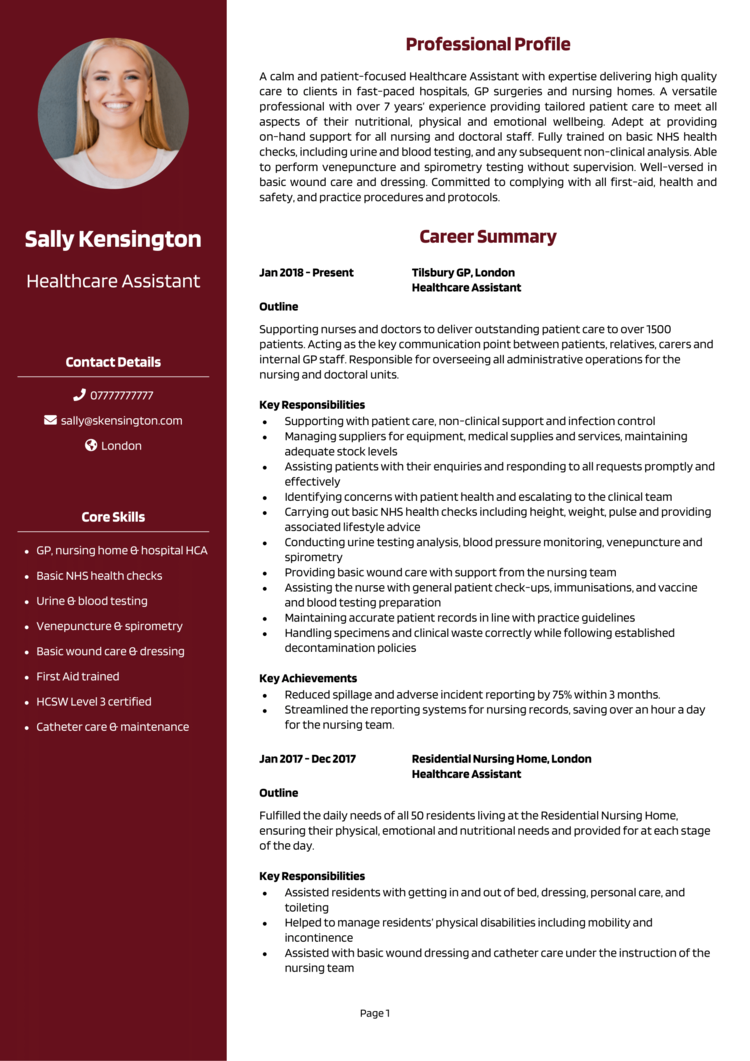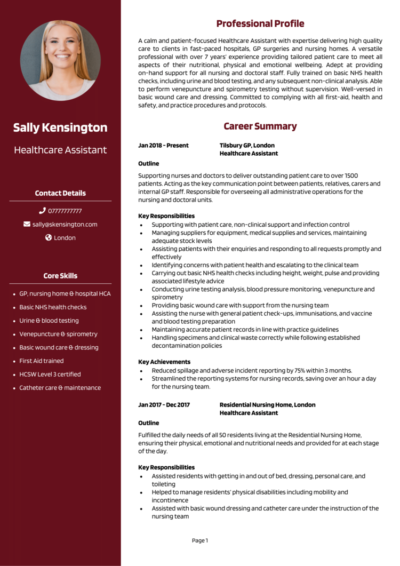Caring, compassionate, and calm under pressure – being a healthcare assistant is as much about people skills as it is about practical care. Whether you’re supporting patients with daily tasks, monitoring vital signs, or assisting nurses and doctors, your role is essential to the smooth running of healthcare settings.
This guide and its Healthcare Assistant CV examples will walk you through how to create a healthcare assistant CV that highlights your experience, skills, and dedication – helping you secure a role where you can make a real difference.
Healthcare Assistant CV

NHS Healthcare Assistant CV

Healthcare Support Worker CV

How to write your Healthcare Assistant CV
Learn how to create your own interview-winning Healthcare Assistant CV with this simple step-by-step guide.
A healthcare assistant’s CV needs to be structured and easy to read – after all, hiring managers don’t have time to search for key information when they’re busy running a care team. If you write your CV in a way that isn’t clear, you might not get the chance to show just how much of an asset you could be.
In this guide, we’ll go through the best way to present your experience, format your CV for maximum impact, and highlight the skills that make you a great healthcare assistant. The result? A CV that’s as well-prepared and efficient as you are on a busy shift.
Healthcare Assistant CV structure


A coherent CV structure makes it easy for employers to see that you have the right skills and experience. Keep it logical and easy to navigate so hiring managers can find key details at a glance, which makes their job so much easier.
Here’s the layout to follow:
- Name and contact details – Place personal details and an option photo of yourself at the top so employers can reach you easily.
- Profile – Start with a strong introduction that highlights your healthcare experience, key strengths, and compassionate approach.
- Core skills – Provide recruiters a snapshot of your most relevant abilities, such as patient care, infection control, and teamwork.
- Work experience – Detail your previous healthcare roles in reverse chronological order, focusing on responsibilities and achievements.
- Education – Show off all of your qualifications, from degrees to certificates, starting with the most recent.
- Additional info – You might optionally include relevant hobbies, interests, or awards which could help you stand out.
Healthcare Assistant CV format


Your CV format should be as professional and well-organised as a patient’s care plan. If it’s unclear or cluttered, hiring managers may assume your approach to work is the same: even the most qualified candidates can let formatting mistakes cause them to miss out.
Stick to these formatting principles:
- Bullet points – Employ short, punchy bullet points to make responsibilities and achievements easy to read.
- Divide sections – Structure your CV with distinct sections that make it easy to scan.
- Use a clear and readable font – Choose a professional, readable font that keeps the focus on your content.
- No more than 2 pages – Aim for two pages – plenty of length to show your expertise without overwhelming the reader.
Healthcare Assistant CV profile


Your CV profile is your chance to introduce yourself to employers. It should be a short but impactful summary that conveys your experience, key skills, and the qualities that make you a great healthcare assistant.
Healthcare Assistant CV profile examples
Profile 1
Compassionate Healthcare Assistant with three years of experience providing patient-centred care in hospital and residential settings. Skilled in assisting with personal care, monitoring vital signs, and supporting medical staff in daily healthcare tasks. Experienced in maintaining patient dignity, ensuring a safe environment, and working collaboratively with nurses and doctors. Passionate about delivering high-quality care and improving patient well-being.
Profile 2
Dedicated Healthcare Assistant with two years of experience in elderly care, specialising in dementia support and mobility assistance. Adept at providing emotional and physical support to patients, administering medication under supervision, and maintaining accurate care records. Skilled in using hoists, assisting with feeding, and ensuring patients feel comfortable and respected. Committed to promoting independence and dignity in care settings.
Profile 3
Experienced Healthcare Assistant with over five years of expertise in community and hospital-based care, assisting patients with daily living activities and medical needs. Proficient in measuring vital signs, assisting with rehabilitation exercises, and documenting patient progress. Skilled in working with multidisciplinary teams to provide high-quality, compassionate care. Passionate about improving patient quality of life through professional and empathetic support.
What to include in your Healthcare Assistant CV profile
Here’s some tips on what you should include:
- Your healthcare experience – Have you worked in hospitals, care homes, or community settings?
- Key skills – Patient care, communication, infection control, and teamwork are all valuable to highlight.
- Compassion and bedside manner – Employers look for candidates who can provide both practical and emotional support.
- Ability to work under pressure – Healthcare is fast-paced, so showing that you can handle the demands of the role is essential.
- Specialist experience – If you have worked with dementia patients, assisted with mobility support, or have knowledge of certain conditions, mention it.
Core skills section


A core CV skills section provides a quick snapshot of what you bring to the role. Since healthcare assistant duties can vary, tailoring this section to the job description is essential.
For example, if the role involves working in a hospital setting, mention skills related to patient observations and ward support. If it’s in a care home, focus on personal care, companionship, and mobility assistance.
Most important skills for a Healthcare Assistant
- Patient Care and Support – Assisting patients with daily activities such as bathing, dressing, and mobility.
- Vital Signs Monitoring – Measuring and recording blood pressure, temperature, pulse, and respiration rates.
- Medical Equipment Handling – Using and maintaining healthcare equipment like hoists, blood pressure monitors, and mobility aids.
- Infection Control Procedures – Following hygiene protocols and PPE guidelines to prevent the spread of infections.
- Nutritional Assistance – Supporting patients with feeding, meal preparation, and dietary requirements.
- Record Keeping and Documentation – Accurately updating patient records, care plans, and observations.
- Medication Support – Assisting with medication administration under supervision and ensuring adherence to prescriptions.
- Emotional and Social Support – Providing companionship and reassurance to patients to enhance their well-being.
- Manual Handling Techniques – Safely moving, lifting, and repositioning patients in accordance with health and safety guidelines.
- Team Collaboration – Working alongside nurses, doctors, and other healthcare professionals to deliver quality patient care.
How to present your work experience in your CV


Healthcare assistants play a vital role in patient care, so your work experience should reflect your ability to support both medical staff and patients. It’s not just about listing duties – it’s about showing how you make a difference.
List your roles in reverse chronological order, highlighting your responsibilities and the impact you had in each position. If you’ve worked in different healthcare environments, tailor your experience to the job you’re applying for.
Formatting your job history for your CV

- Outline – Introduce the healthcare setting, your role, and the type of patients you supported.
- Responsibilities – Describe your main tasks, such as assisting with daily care, taking observations, or supporting mobility. Use action words like “assisted”, “monitored”, and “supported”.
- Achievements – Highlight measurable successes, such as improved patient comfort, positive feedback from staff, or efficiency improvements in patient care.
Example jobs for Healthcare Assistant
Healthcare Assistant | St John’s Hospital
Outline
Provided hands-on patient care in a busy hospital ward, assisting nurses and medical staff in delivering high-quality healthcare services.
Responsibilities
- Assisted patients with personal care, including bathing, dressing, and feeding.
- Monitored and recorded vital signs such as blood pressure, temperature, and oxygen levels.
- Helped patients with mobility and repositioning to prevent bedsores.
- Maintained accurate patient records and reported any concerns to nursing staff.
- Provided emotional support to patients and families, ensuring dignity and respect.
Achievements
- Recognised for maintaining high patient satisfaction scores through compassionate care.
- Improved efficiency by implementing a new patient monitoring system with nursing staff.
- Assisted in reducing patient falls by 20 percent through improved mobility support.
Healthcare Assistant | Sunrise Care Home
Outline
Supported elderly residents with daily care needs in a retirement care home, ensuring a safe and comfortable living environment.
Responsibilities
- Provided personal care assistance, including washing, dressing, and toileting.
- Assisted residents with mobility support, using hoists and walking aids safely.
- Monitored dietary intake and assisted with feeding where necessary.
- Engaged residents in social activities to improve mental well-being and reduce isolation.
- Maintained accurate care plans and reported changes in health conditions to senior staff.
Achievements
- Helped improve resident well-being by introducing personalised activity plans.
- Reduced response time for assistance requests by 25 percent through improved coordination.
- Praised by families for providing compassionate and attentive care to residents.
Healthcare Assistant | Sapling Carers
Outline
Delivered home care services to patients with various medical conditions, supporting their independence while ensuring they received essential care.
Responsibilities
- Provided home visits to assist with personal care and daily living activities.
- Administered medication under supervision and ensured adherence to care plans.
- Supported patients with meal preparation, housework, and errands.
- Monitored patient conditions and reported any health concerns to healthcare professionals.
- Provided companionship and emotional support to improve patients’ quality of life.
Achievements
- Helped 90 percent of clients maintain independence by supporting daily activities.
- Recognised for delivering exceptional patient care, receiving excellent feedback from clients.
- Reduced hospital readmission rates by ensuring proper at-home care and monitoring.
Education and Qualifications


While practical experience is certainly most important, your education is vital in proving you’ve got the foundational skills and qualifications for a role in the healthcare field. If you have relevant training or certifications in care work, make sure they stand out.
If you’re new to healthcare, highlight any coursework, voluntary work, or additional training that’s relevant to the role. List these qualifications in reverse chronological order, starting with the most recent one you earned.
Recommended qualifications for Healthcare Assistants
- Level 2 or Level 3 Diploma in Health and Social Care – A common qualification for healthcare assistants.
- Care Certificate – A valuable qualification for those new to care roles.
- First Aid and CPR Certification – Important for handling medical emergencies.
- Manual Handling Training – Essential for assisting patients safely.
- Infection Control Training – A key qualification for maintaining hygiene and patient safety.





